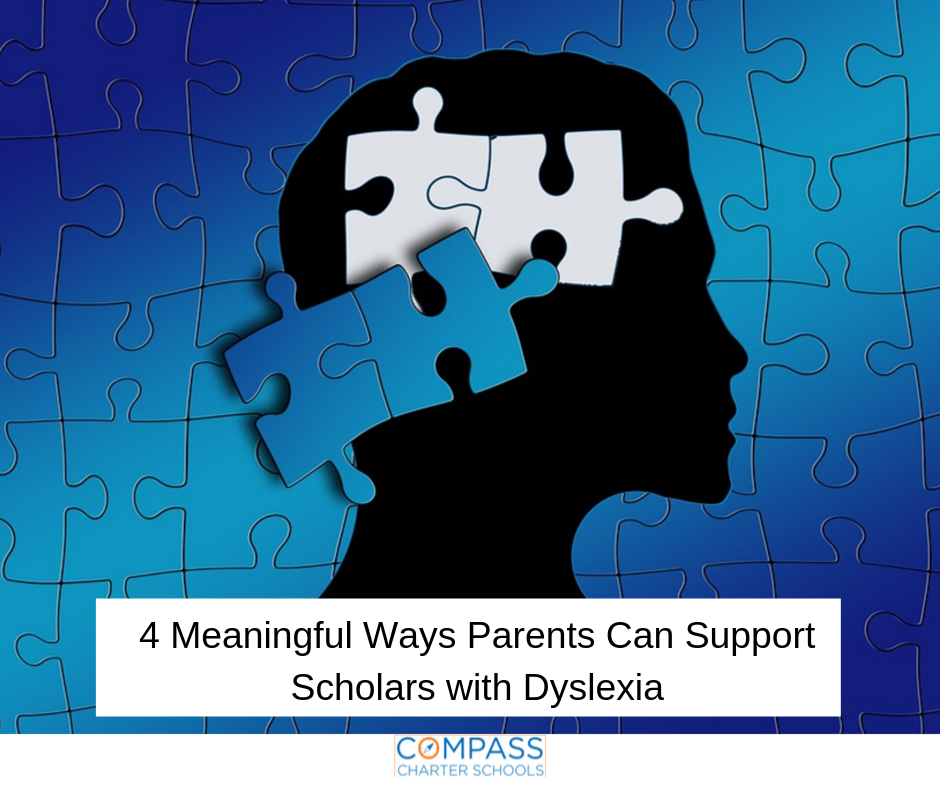
October is Dyslexia Awareness Month and Compass Charter Schools (CCS) is recognizing the important awareness campaign by sharing a few meaningful ways parents can support a child living with dyslexia.
The International Dyslexia Association reports that dyslexia is one of the most common language-based learning disabilities. It’s reported that Between 5-10 percent of the population is estimated to have dyslexia while 70-80 percent of those with reading difficulties are likely to have some form of dyslexia. It’s a neurological condition caused by a different wiring of the brain. Currently, the exact causes of dyslexia are still not completely clear, but anatomical and brain imagery studies show differences in the way the brain of a person with dyslexia develops and functions.
CCS has a great team of credentialed special education teachers who have shared four meaningful ways that parents can support their scholar with dyslexia:
Encourage Decoding Skills
Parents can work with the scholar’s special education teacher to learn about implementing decoding skills at home. Scholars can use decoding skills which can help scholars with dyslexia build phonemic awareness and learn how to sound out words and break them down into sounds. The process of decoding often allows scholars to blend sounds and make words by looking at letters as sounds.
A helpful way that parents can encourage decoding skills at home is by using “silly” or nonsense words. Curricula like Barton and Orton Gillingham incorporate silly words to help teach sounds and decoding for scholars who exhibit signs of dyslexia (i.e tiff, zoop, nan, rox, lish, ep). By focusing on letter sounds, scholars can apply decoding skills to sound out unfamiliar words.
Use Reading Comprehension Techniques
Parents can help their scholar with dyslexia using reading comprehension techniques at home. Before reading an entire paragraph, scholars can read the first and last sentences of the section to gain prior knowledge of the reading. Often, having prior knowledge of the text can help scholars with dyslexia piece together the entire reading. They can use context clues based on the prior knowledge that they gained to make sense of the entire text.
Once the scholar has finished reading the entire text, parents can gauge their overall understanding by asking, “what did you learn?” Asking this question can help parents see if their scholar truly understands the reading, or if they may need to read the text again to gain a better understanding. Parents can support their children with dyslexia by encouraging them to take their time and avoid rushing by reading out loud. Parents can also get their child a reading guide that will help their scholar read one line of text at a time. Using a reading guide can help scholars with dyslexia slow down while reading and simplify the visual field so that they can focus on one sentence at a time.
Celebrate the Small Victories
We believe that it’s important to help children with dyslexia feel comfortable while reading even though it may be challenging. Children with dyslexia often feel frustrated and discouraged when trying to read. It’s common for them to feel anxious or even sometimes embarrassed while reading. Parents can support their children with dyslexia by building up their self-esteem and confidence while reading. Parents can help their children celebrate the small victories and accomplishments that they achieve when they read. We encourage parents to put less emphasis on correcting their errors and to put more focus on celebrating their small wins. Parents can celebrate with their children each time their child with dyslexia remembers how to pronounce words correctly or recognize the correct spelling of words while they read.
Advocate for Accommodations
Children with dyslexia are eligible for certain accommodations at school. We encourage parents to support their child with dyslexia by learning about these accommodations and then requesting these accommodations for their child while they’re at school. Children with dyslexia can often be excused from reading out loud during class, they may be exempt from a foreign language requirement, they can often receive extra time for tests and other accommodations to help them succeed in class.
The accommodations for children with dyslexia can vary depending on the school and state guidelines. They are designed to help children with dyslexia focus and feel less anxious, overwhelmed or embarrassed in front of their classmates. The accommodations give them more time for tests and other assignments so that they can read slowly and submit their best work. Parents can have a positive impact on their child’s educational experience by advocating for these accommodations.
______________________________________________________________________________________________________________
Compass Charter Schools (CCS) is a WASC-accredited virtual charter school that serves families throughout California. Interested in learning more about CCS’ flexible academic programs? Visit our website, or contact our enrollment team at enrollment@compasscharters.org or (877) 506-8631.
